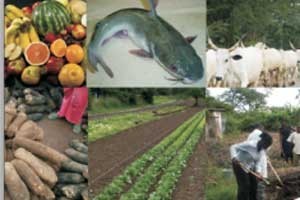 Transparent inter-sectoral collaboration between the Federal Ministry of Agriculture, other agencies, states and local governments and enabling environment for a strong private sector involvement and investment in the sector have been identified as part of the policy reforms strategies that would ensure enduring growth of the agricultural sector of the economy.
Transparent inter-sectoral collaboration between the Federal Ministry of Agriculture, other agencies, states and local governments and enabling environment for a strong private sector involvement and investment in the sector have been identified as part of the policy reforms strategies that would ensure enduring growth of the agricultural sector of the economy.
Delivering the lead paper on “Sustaining the Positive Outcome of the Agricultural Transformation Agenda for Attaining Competitiveness, Sustainability and Inclusive Growth,” during the Food Security and Agriculture session at the just concluded Nigerian Economic Summit in Abuja, a Senior Agriculture Economist with the World Bank, Dr. Adetunji Oredipe, maintained that finding solutions to the problems of the sector must involve all critical stakeholders: “Strengthening collaboration between Federal and State Ministries and improving overall coordination is crucial. A thriving agricultural industry will require support from other ministries and agencies of government at federal and state levels.”
Oredipe, who also served as the Senior Technical Adviser to the former Minister of Agriculture, Dr. Akinwumi Adesina, observed that in a major departure from past approaches, Agriculture is now being treated as a business, not a development program. He recollected that “until the early 1970s, Nigeria was self-sufficient in food production with a small surplus for export and agriculture was the main foreign exchange earner. The sector stagnated thereafter due to the discovery, exploitation and exports of oil and a subsequent policy to shift resources from agriculture to the oil-industry.”
However, since agriculture employs an overwhelming share of the Nigerian labor force, stagnation of the sector resulted in increased poverty incidence. Poverty, according to Oredipe, “remains largely a rural phenomenon with headcount of 44.9 per cent compared to 12.6 per cent in urban areas thereby necessitating the prioritisation of rural transformation and provision of employment, particularly youth employment, and also adoption of a gender sensitive approach in the sector.”



